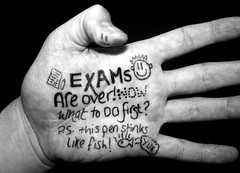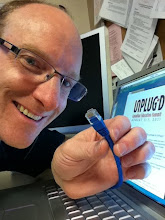 This evening, I learned that the exams my daughters wrote last week, will not be returned. For the sake of maintaining the security of the exams, which I presume will be used again and again, exam-writers will never see how their responses were graded.
This evening, I learned that the exams my daughters wrote last week, will not be returned. For the sake of maintaining the security of the exams, which I presume will be used again and again, exam-writers will never see how their responses were graded.Am I alone in shaking my head at this reality?
Why I Dislike Exams
Too often, exams test 'facts' which any student would be able to find via Google.
Too often, exams are completed only with paper and pencil.
Too often, exam results comprise a significant proportion of a student's final grade.
Too often, exams are most stressful to those least likely to benefit from the experience.
Too often, exams are ineffective in their attempts to assess learning that took place throughout an entire course.
Too often, the knowledge and understanding demonstrated through exams, cannot be repeated in days following the exam.
Too often, exams test language skills, rather than course specific expectations.
Too often, final grades are the only feedback students get on their exam experience.
Too often, exams measure knowledge and understanding, completely devoid of meaningful context.
 I've heard the argument that we need exams to prepare students for university... Yet, in some places policies exist to exempt the very students who might one day have to write post-secondary exams. Are exemptions a way to reward high achievers, or a way to penalize low achievers?
I've heard the argument that we need exams to prepare students for university... Yet, in some places policies exist to exempt the very students who might one day have to write post-secondary exams. Are exemptions a way to reward high achievers, or a way to penalize low achievers?As observant teachers grow in confidence, assessing the learning of their students through rich day-to-day experiences, perhaps the authority long held by written tests, will be gradually diminish...
Photo Credit: Jon Oakley; COCOEN




9 comments:
I really enjoyed your thoughts on exams and full-heartedly agree that conventional pen-and-paper exams are not the way. However, I must speak on behalf of those exams which are either practical or presentation/performance related. I have found exams such as these to be very good at gauging the student's abilities and the knowledge they gained throughout the class. On further note, they are also likely to actually receive full feedback on their exams from the teachers. In some cases, they will even be able to receive said feedback along with a mark at the end of the exam instead of waiting and taking on undue stress. I vote for this as an option to replace exams with. :)
I fully agree with you. If a student is not allowed to see and learn from the exam how meaningful can it be? I have too often seen the knowledge and understanding that cannot be repeated a few days later. We recently had the chance to meet with a specialist to learn "easy" ways to get our students to perform better on the tests. I kept thinking of learning vs. testing and what a waste of money it was in these times.
I do not have the opportunity to allow my students to see their final exams in my class, as they've moved on, but I'm happy to show a student her exam if she should come see me and ask to see it.
I think your questions about exemptions are well-put.
I think part of the problem is that we tie exams as the END of the course, rather than an opportunity to demonstrate learning, and to reflect on how effectively we've met the expectations of a given course.
I agree with you Tim, If we were to design opportunities from scratch, for students to demonstrate their learning and achievement, I'm sure we could do better than written tests.
Knowing that local boards now schedule exams over 4 or 5 days, matching the number of periods of the day; teachers could theoretically take as much of the day as they'd like to complete a performance assessment.
Sean and Kimberly, If exams have to be the final event, do you think we could see more effective use of the flex days between semesters to provide students with meaningful feedback?
I love exams the way I love Euchre. I have been able to beat most people at both games!
Most exams aren't made to be part of the learning and evaluation process. Thanks for that article! I shared it with a couple of colleagues!
Great post! I agree with the comments that an exam as an "exit" assessment certainly restricts any benefits to learning. I also agree with Ross, that succeeding on exams often depend on how well a student plays "the game". Although, i've never seen Ross play Euchre, I have seen the math team in action playing Wizard a few summers back and was scarred for life. :)
I think exit/debrief meetings with the teacher should be mandatory (for high school courses, not Wizard).
Hold on :) . Let's be careful. I agree full heartedly with every single one of your comments, in particular the exemption item. But...
#1. Exams did have a valuable place. They were a good idea and served a valuable need back in the day. It was necessary to be able to accumulate volume of info and be able to use it under stress. I suspect that era is largerly over.
#2.But let us not throw out the baby with the bath water as we ponder what education might look like. Perhaps exams need to serve a slightly different purpose and perhaps for a particular set of students.
#3. I laughed at myself at a recent tweet about the rise of cheating on tests and exams via cell phones. The article continued on to scold students over their lack of character and warned of a future at post-secondary when this type of behaviour was most strictly dealt with. My immediate response was,..."if a students can acquire the answer to a question in 1.5 min by using technology in secret over a watchful and scolding eye...are you asking the right questions?" In the past, those answers were important, perhaps that info is less important now. Does this mean the end of exams? I think not.
#4. My grade 11 and 12 chemistry and physics students on their way to uni do not have their exams returned, although they are available for viewing as students desire. The entire semester is focusing on gaining a foundation of knowldge and practicing a way of thinking with the end game of being able to reasonable answer a previously unseen question. Every class, every test is used to present previously unseen questions. By the end of the semester, they have enough experience in enough different topics, that very interesting novel problems can be asked thank link the start with the middle and end in meaningful ways.
#5. They get feedback all semester long on their learning.
#6. They also have a large hands-on project that takes them the better part of a month of class time to complete with amble feedback, and multiple iterations, that is worth a equal portion towards their final grade as the exam (max 20% each).
#7. Let's not necessarily get rid of ALL exams. Let's avoid the "All exams are Bad" at the same time that we also avoid "you have to have an exam that looks like this."
#8. I teach one class called science 12 for the same clients as previously listed that has not a single test or exam. There is a time and place for everything.
Agreed... the time to need to recall a volume of information, is a time that has passed. If a key value of exams is to get people to perform under stress, I think we need a new model.
Being able to apply skills and knowledge to novel situations is the true test. I'm not so sure that such a test can authentically be done on paper. When culminating tasks can take place over a period of time, in a circumstance other than seated in a quiet room, using a wide variety of tools to solve authentic problems... I don't think they'll still be called exams. :)
Post a Comment